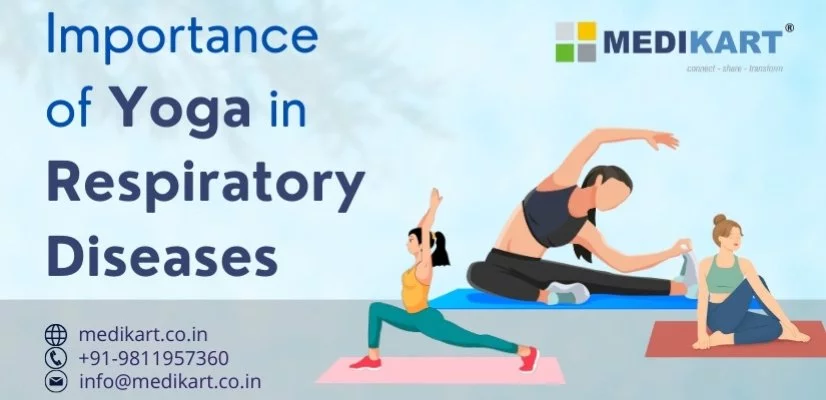Importance of yoga:
It is important to breathe in order to survive. Breathing correctly reduces stress, enhances immunity, and keeps you healthy.
What are Respiratory Diseases?
The disease affects the lungs and other components of the respiratory system. Infection, cigarette smoking, secondhand tobacco smoke, radon, asbestos, and other forms of air pollution can all cause respiratory disorders. Asthma, chronic obstructive pulmonary disease (COPD), pulmonary fibrosis, pneumonia, and lung cancer are all respiratory disorders.
How to Diagnose Respiratory Diseases
The most prevalent respiratory disorders are asthma, pneumonia, chronic obstructive pulmonary disease (COPD), tuberculosis (TB), bronchitis, and lung cancer. Shortness of breath, chronic coughing, chest pain, and hemoptysis (blood in sputum) are common symptoms of respiratory diseases. It's crucial to remember that persons with asthma often experience symptoms including sputum coughing, fatigue, and reliance on seasonal variations. Common TB patients cough up sputum, have hemoptysis, and experience weight loss. COPD patients cough up mucus and experience severe exhaustion, which worsens without proper treatment.
Yoga and Respiratory Diseases
Practicing pranayama and other yoga activities regularly is the most effective technique to improve breathing capacity and prowess. These holistic practices include a variety of techniques or asanas to raise lung capacity and the capacity of the complete breathing system, minimizing the risk of respiratory disorders and/or lessening their impact, if they do exist. To stay healthy, add the rigorous, long-term practice of Pranayama and Yoga’s restorative therapies to your to-do list.
How can Yoga help?
Positive thought and meditation, relaxation, exercise, pranayama, and a nutritious diet are the five pillars of yoga. Controlled breathing, also known as pranayama, is a technique that can help us improve our lung capacity and overall physical processes by managing how much we breathe in and out on a regular basis. The approach improves the human breathing system by utilising diaphragmatic and abdominal muscles. Pranayama techniques such as Kapalbhati, Nadisuddi, Bramhari, Bhastrika, and others have been demonstrated to benefit practitioners when practised regularly. And if we want strong lungs that last a lifetime, we must do them on a regular basis. In addition to pranayama, the yogic activities known as yogasanas provide numerous benefits. This type of activity links our bodies to our hearts.
Yoga Asanas and a Healthy Diet
Dhanurasna, Bhujangasana, Matsyasana, and Trikonasana are some of the yoga postures that can be used to treat respiratory problems such as tuberculosis, asthma, COPD, and bronchitis. These poses are excellent for clearing the lungs and strengthening the chest muscles. Surya Namaskar, for example, is a layered asana that has substantial purifying benefits on our internal organs while also providing a sense of relaxation. All of these techniques, however, must be used in conjunction with a healthy diet as part of our everyday routine. Fresh fruits, vegetables, and pulses should be eaten on a daily basis and cooked with spices that are suited for your body dosha type and season. Consuming locally grown seasonal fruits and vegetables increases our immunity and aids in disease prevention. While all of this may seem like common sense, our lungs will not be powerful unless our whole health is in good shape.
Conclusion
The idea of going back to one's roots have captivated the modern world. Yoga asana is a gift from the ancient world that has been scientifically studied since the eighteenth century. Many previous pieces of study have already shown many of its benefits, and the studies are attempting to prove its numerous therapeutic impacts on the human body. Yoga provides a number of well-documented pulmonary health benefits, as well as other perks. Yoga is recommended for maintaining good mental, physical, and spiritual health.
Disclaimer
The information provided is for general knowledge only. Consult your doctor for personalized advice and treatment. Medikart HealthCare not liable for any actions taken based on this info.

